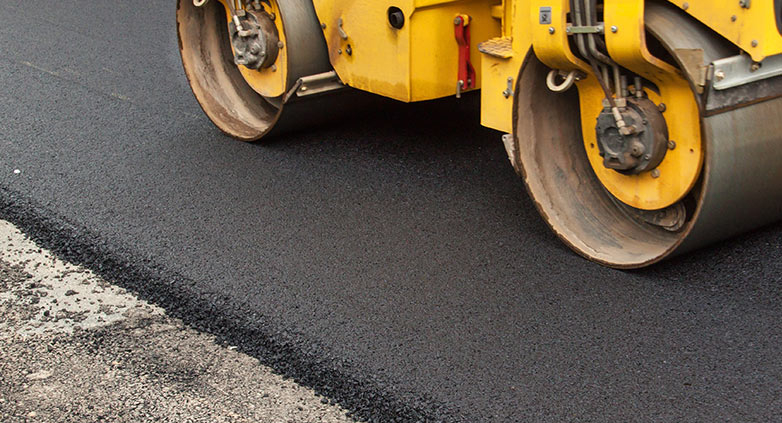Is 2 inches of Asphalt Enough For a Driveway?
When planning a new driveway or renovating an existing one, the thickness of the asphalt is a crucial decision. Amidst varying professional opinions, homeowners often grapple with determining if 2 inches of asphalt is adequate for their needs.
While 2 inches of asphalt may work for light-traffic residential driveways in moderate climates, it’s typically insufficient for enduring heavier vehicles or harsh weather. For most home driveways, a thickness of 3-4 inches is advisable to balance cost with longevity and performance. In commercial settings or for driveways bearing frequent heavy loads, opting for a thickness of 6 inches or more ensures greater durability and resistance to wear and tear. Understanding your driveway’s usage and exposure to elements is key in deciding the right asphalt thickness.
Explore further to understand the intricacies of asphalt thickness and how it impacts the durability and functionality of your driveway. Learn to make informed decisions that align with your specific requirements and environmental conditions.
Ideal Asphalt Thickness for Your Driveway
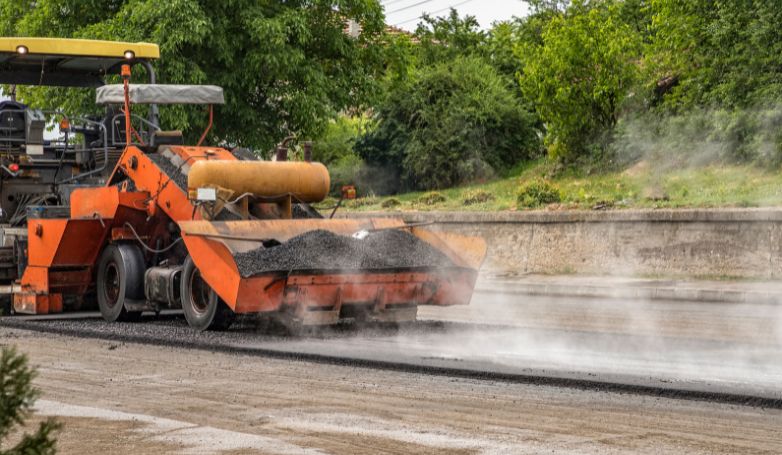
When considering the thickness of asphalt for a driveway, it’s essential to weigh several factors to arrive at the best decision. One common question homeowners ask is, “Is 2 inches of asphalt enough for a driveway?” This depends on various elements that define your driveway’s requirements, such as the type of vehicles it will support and the expected traffic volume.
- Usage and Longevity: The primary factor is the intended use of the driveway and how long you expect it to last without major repairs. Different usage intensities call for varying thicknesses to ensure durability.
- Residential Driveways: For most residential properties, a 2-inch thick asphalt layer can be adequate. However, investing in a 3-4 inch thickness offers better longevity and value for money. This extra depth provides a stronger foundation, better withstanding the rigors of daily vehicle traffic.
- High Traffic and Load: In cases of driveways that experience high traffic or bear heavier vehicles, such as in commercial settings, a minimum of 4 inches of compacted asphalt is recommended. This thickness is crucial to withstand the increased wear and tear, ensuring the driveway remains functional and aesthetically pleasing for a longer period.
Professional Guidance in Asphalt Thickness Decision
Consulting with a professional paving contractor is vital in this decision-making process. They can offer tailored advice based on the specific conditions and usage patterns of your driveway, ensuring that you choose the right thickness for your unique situation. A professional assessment helps in balancing cost, functionality, and longevity, ultimately leading to a more informed and effective paving choice.
Critical Role of Asphalt Thickness in Pavement Durability
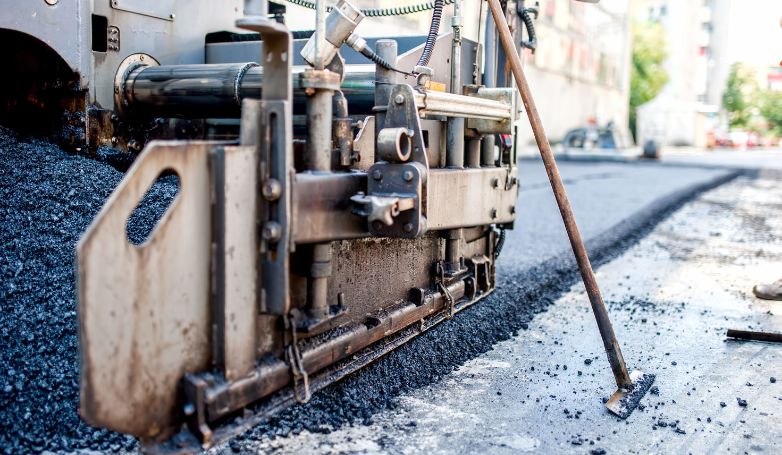
The thickness of asphalt plays a pivotal role in determining the durability and performance of pavement. Here, we explore key factors such as the foundation, sub-base quality, and the importance of seeking expertise from professional paving contractors in ensuring the longevity of asphalt pavement.
The Foundation of Asphalt Pavement: Usage and Sub-Base Considerations
The thickness of your asphalt pavement is a key factor in its longevity and performance. This decision hinges on the intended usage of the driveway and the type of vehicles it will support. For light vehicles, a thinner layer of asphalt may be sufficient, but for heavier commercial vehicles, a thicker layer is essential to withstand the increased load.
The Impact of Sub-Base Quality
A solid and well-prepared sub-base is fundamental for the longevity of your asphalt driveway. If the sub-base is weak or improperly constructed, even a sufficiently thick asphalt layer can degrade quickly, leading to frequent and costly repairs. Ensuring a robust sub-base is crucial for the asphalt to maintain its integrity over time.
Seeking Expertise from Professional Paving Contractors
Consulting with a professional paving contractor is crucial in determining if 2 inches of asphalt is enough for a driveway. Local experts understand the unique environmental and usage factors of your area. They can recommend the ideal asphalt thickness and ensure a solid sub-base is prepared, setting the stage for a long-lasting and durable driveway.
Asphalt Thickness for Commercial Use
When it comes to commercial driveways or parking lots experiencing heavy traffic, the thickness needs to reflect this increased demand. Heavier vehicles and continuous usage necessitate a thicker layer of asphalt to prevent rapid wear and tear. The exact depth will depend on the expected volume and type of traffic, a calculation where professional input is invaluable.
Arming Yourself with Information
It’s essential to be well-informed about the importance of asphalt thickness. An adequate depth is crucial to prevent sudden and unexpected deterioration, ensuring durability and extending the service life of your pavement. A well-thought-out decision on thickness will lead to a high-quality, durable, and long-lasting driveway or parking lot, aligning with your specific needs and expectations.
Advantages of Thicker Asphalt in Pavement Construction
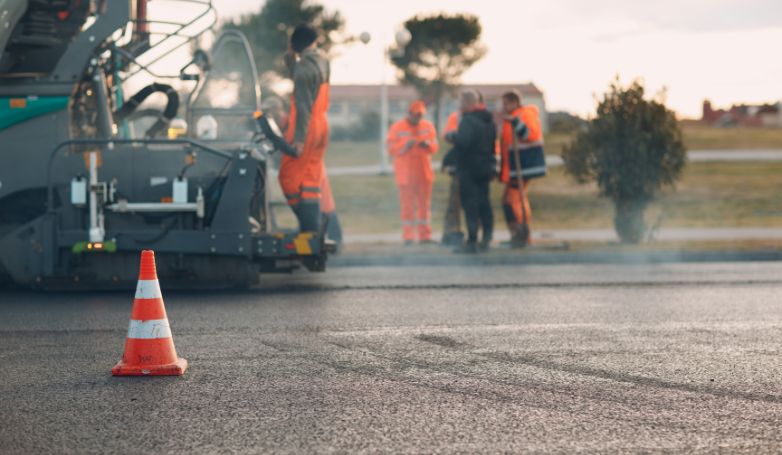
When planning a paving project, one of the key decisions is the thickness of the asphalt layer. This choice has far-reaching implications for the pavement’s performance, maintenance requirements, and overall lifespan. Many wonder, “Is 2 inches of asphalt enough for a driveway?” as they consider the benefits of a thicker asphalt layer. These benefits directly contribute to the pavement’s long-term success and functionality. Understanding these advantages can help in making a more informed choice, ensuring that the pavement meets both current needs and future demands.
Enhanced Durability and Longevity
Choosing a thicker layer of asphalt for your driveway or parking lot construction is a decision that significantly impacts its durability and longevity. This thickness makes the asphalt less prone to common forms of wear and tear, such as cracking, which is especially beneficial in high-traffic areas. Thicker asphalt can withstand daily vehicle stress better, leading to a reduced frequency of repairs and ultimately lower maintenance costs over the pavement’s lifespan.
Superior Weather Resistance

A thicker layer of asphalt demonstrates a stronger resistance to weather conditions. It copes better with temperature fluctuations, which means it is less likely to crack in cold conditions or soften in extreme heat. This feature is crucial in areas experiencing severe or varying climates. Additionally, the thicker the asphalt, the better it protects against water infiltration, which can cause structural damage like potholes, further extending the pavement’s service life.
Improved Load-Bearing Capacity
The load-bearing capacity of a pavement is significantly enhanced with thicker asphalt. This quality is essential for surfaces expected to support heavy or commercial vehicles. Thicker asphalt distributes the weight of these vehicles more efficiently, reducing the risk of rutting and structural damage. In high-traffic commercial or industrial settings, the extra thickness provides necessary stability and endurance. This helps in maintaining the pavement’s structural integrity under various traffic conditions and ensuring continued functionality and safety.
In conclusion, a thicker asphalt layer requires a higher initial investment. However, the long-term benefits in durability, weather resistance, and load-bearing capacity justify this choice, making it a practical and cost-effective solution for many paving projects.
The factors that affect how thick asphalt needs to be

You may sometimes question how thick the asphalt pavement should be when contemplating full-depth construction. Sadly, the answer is not straightforward because various factors influence the depth of an asphalt driveway or parking lot. Before determining the suitable thickness, asphalt paving contractors typically consider multiple variables.
The factors that affect how thick asphalt needs to be for a perfect driveway or parking lots include:
- The Type of Soil
- Traffic Volume and Composition
- Layers of Asphalt
The type of soil
In asphalt thickness, data gathered about the soil plays a significant role. Subgrade material will most of the time be rock or soil, which needs to be thoroughly grasped before constructing pavement.
If the soil is gravelly or sandy, it should compact correctly and offer good drainage. Conversely, it will be more challenging to achieve appropriate compaction if the soil is either clay, loamy or other soft types.
It is required that the soil provide a solid, stable base for the finished pavement.
To accomplish this, the engineers grade and compact the soil to create the subgrade. It may be important to remove and substitute some soil. If your contractor cannot obtain sufficient compaction, the use of an aggregate subbase becomes necessary. The level to which the soil can be compacted can influence the asphalt depth required to provide the best outcomes.
Traffic volume and composition
How heavy the vehicles that will be using the pavement, the average number of cars that will use the pavement daily, and the frequency they will be traveling are all factors that need to be taken into account.
Areas often used by trucks will need thicker pavement to withstand heavier vehicles. While the typical suburban driveway probably won’t need the same modifications.
For instance, a residential driveway where about three to four cars will drive on at a low-speed per day does not have to be as dense as the pavement on a major highway carrying hundreds of articulated trucks and thousands of cars daily.
Layers of asphalt
There are various types of asphalt mix available, such as open-graded and conventional asphalt pavement. The asphalt pavement’s thickness can be affected by the size of the aggregates.
For instance, the general rule is that each layer’s thickness must be at least three times higher than the aggregate’s nominal maximum size; a standard asphalt mix may be the lower layer, but the surface layer may use a thinner layer of a mix with smaller aggregates to provide extra aesthetic appeal without compromising strength.
The Risks of Inadequate Asphalt Thickness in Driveways and Parking Lots

Before delving into the specific risks, it’s essential to understand the pivotal role that asphalt thickness plays in the overall performance of a driveway or parking lot. This leads many to ask, “Is 2 inches of asphalt enough for a driveway?” The thickness of the asphalt is not merely a construction detail; it’s a critical factor that determines how well the pavement will hold up against the challenges of daily use and environmental factors. A proper thickness ensures the pavement can withstand the weight of vehicles, resist weather-related damage, and maintain its structural integrity over time.
Structural Integrity at Stake
The thickness of an asphalt driveway is not just a measurement—it’s the backbone of the driveway’s structural capacity. An inadequately thick asphalt layer can lead to significant issues. If the asphalt is too thin for its intended use, it will be prone to random cracking. Over time, these cracks can expand, leading to the complete breakdown of the driveway’s surface. This deterioration not only affects the driveway’s appearance but also compromises its functionality and safety.
Impact on Durability and Lifespan

Durability is a key consideration for any paving project. If the asphalt layer is insufficient for the expected traffic, especially heavy commercial vehicles, the surface will wear down much faster than anticipated. This accelerated degradation means more frequent repairs and a shorter overall lifespan of the driveway or parking lot. For commercial purposes, where large trucks and heavy equipment are common, at least 4 inches of asphalt thickness is essential to withstand such demands.
Heavy-Duty Requirements for Commercial Lots
In full heavy-duty commercial lots, where the traffic volume and vehicle weight are significantly higher, an even greater thickness is required. This additional thickness is critical to providing the necessary durability to withstand the constant stress from heavy vehicles. It’s not just about handling the immediate load but ensuring the longevity and continual performance of the asphalt surface under extreme conditions.
Avoiding Early Deterioration
The consequences of an insufficiently thick asphalt driveway are not limited to aesthetics. If heavy vehicles like big trucks frequently traverse a driveway that’s not built to support such load, early deterioration is inevitable. This not only leads to increased maintenance costs but also poses safety risks. The surface can become uneven, leading to potential hazards for vehicles and pedestrians alike.
Ultimately, ensuring the correct thickness of your asphalt driveway is crucial for its long-term performance and sustainability. It’s an investment in the safety, functionality, and aesthetics of your property. Avoiding the pitfalls of an inadequately thick asphalt layer will save you from future headaches and unnecessary expenses.
Cost Considerations in Thicker Asphalt Pavement Construction
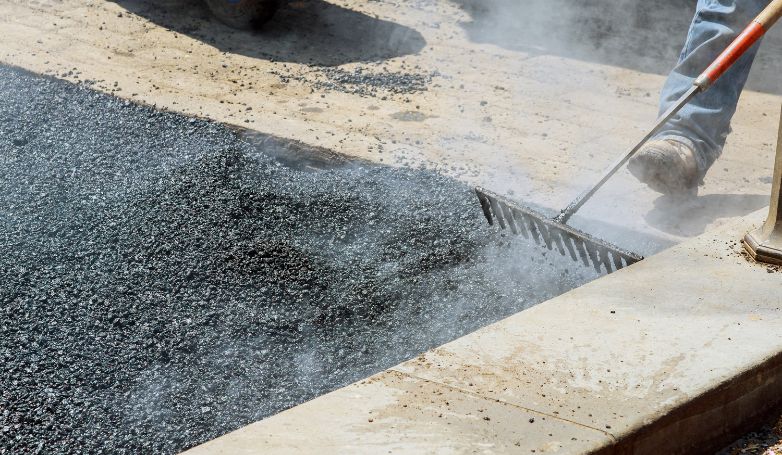
In any paving project, the thickness of the asphalt significantly influences both the initial installation costs and long-term financial commitments for maintenance and repairs. It’s essential to consider these costs carefully to understand the full financial implications of choosing a thicker asphalt layer. When discussing your project with a professional contracting company, make sure to delve into the specifics, including the optimal thickness for your driveway. Questions like “Is 2 inches of asphalt enough for a driveway?” often arise in these discussions, prompting a thorough examination of the balance between upfront expenses and the durability of the asphalt layer over time.
Initial Installation Costs
The initial financial outlay for installing a thicker layer of asphalt is an important consideration. This involves more than just the cost of additional asphalt material; it also encompasses the associated labor and potential equipment costs. A thicker layer typically requires more material, which directly increases the cost. Additionally, the process of laying and compacting a thicker layer can be more labor-intensive and may require specialized equipment. These factors combined can lead to a higher initial investment. However, it’s essential to balance these upfront costs against the long-term benefits, such as reduced need for repairs and longer intervals between major resurfacing projects.
Long-term Maintenance and Repair Expenses
When considering the long-term financial impact of thicker asphalt pavement, the reduced frequency of repairs and the extended lifespan play a crucial role. Thicker asphalt is less susceptible to damage and wear, translating to fewer repairs over time. This can significantly lower the long-term maintenance costs associated with the pavement. Furthermore, the extended lifespan of a thicker asphalt layer means that major resurfacing or replacement projects can be spaced out further apart, leading to considerable cost savings over the years. In high-traffic or commercial areas, where pavement is subjected to more intense use, the cost-efficiency of a thicker layer becomes even more pronounced. The higher initial investment can be offset by the reduced need for frequent, costly repairs, making it a financially sound choice in the long run.
Wrap Up
In conclusion, while the initial cost of installing a thicker layer of asphalt may be higher, the long-term savings in maintenance and repair expenses often make it a more cost-effective option, leading to the question: is 2 inches of asphalt enough for a driveway? Thicker asphalt proves to be a wise investment for projects where durability and long-term performance are key priorities.
What causes asphalt driveway damages?

Apart from improper thickness of a driveway or parking lot, other things cause asphalt driveways to deteriorate quickly. There are:
- Poor drainage
- Lack of maintenance
- Poor subgrade load-bearing ability
Poor drainage
Poor drainage causes damage to the asphalt driveway. To build a proper asphalt driveway, you need to carry out good drainage. There needs to be no humidity; ensure the water is drained away entirely before you can begin to pave.
Lack of maintenance
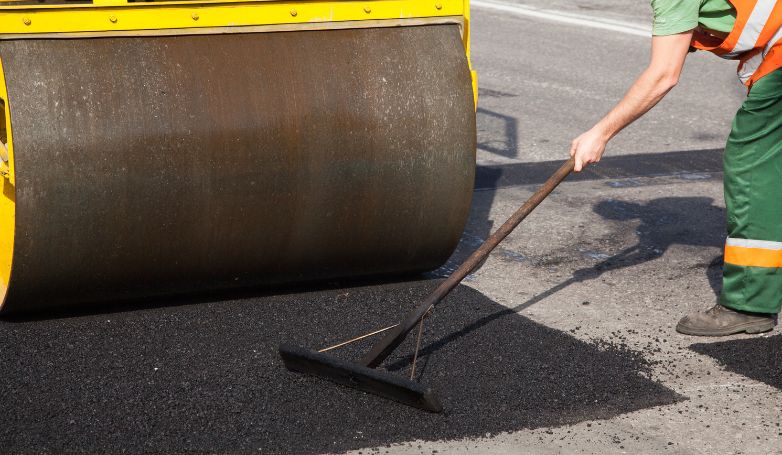
It is common for asphalt pavement to crack as it ages due to continuous exposure and weather patterns. Fortunately, you can detect and fix several cracks with a yearly checkup. Pavement seal coating and crack sealing are a good maintenance practice to prevent water damage.
Poor subgrade load-bearing ability
It is commonly reported that inadequate subgrade results in pavement damage. This happens when the soils below the asphalt base layer are clay-based rather than stone-based. If you observe ruts appearing in your parking lot or driveway after a round of rain, it could be a sign that the subgrade is unable to support the weight.Related Articles:
Conclusion
The thickness of an asphalt driveway plays a critical role in its longevity. The purpose of designing a driveway is also to determine how thick it should be. When consulting with a professional contracting company about your driveway project, it’s essential to discuss specifications, including the appropriate thickness. This ensures that the asphalt layer meets the necessary standards for durability. A common question that arises in such discussions is, “Is 2 inches of asphalt enough for a driveway?” This consideration is vital to achieving the right balance between cost and longevity for your specific project.

